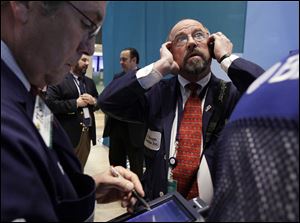
Stocks lower as investors watch Washington
Stocks lower on Wall Street as investors watch Washington; big gain for Best Buy
12/13/2012
FILE - In this Tuesday, Dec. 11, 2012, file photo, Trader Frederick Reimer, right, works on the floor of the New York Stock Exchange. Stocks opened close to break-even Thursday after the government said weekly applications for unemployment benefits fell to the second-lowest level this year. (AP Photo/Richard Drew, file)
NEW YORK — Stocks were slipping today on Wall Street after more signs of tension emerged from federal budget talks in Washington.
The Dow Jones industrial average was down 31 points at 13,214 as of 11:50 a.m. The Standard & Poor's 500 index was down five points at 1,423. The Nasdaq composite index was down nine at 3,005.
In Washington, House Speaker John Boehner said that the White House was so resistant to cutting government spending that it risked pushing the country off the “fiscal cliff.”
The “cliff” is tax increases and government spending cuts that take effect Jan. 1 unless Congress and the White House reach a deal to avert them. Economists have warned that the “cliff” could eventually lead to a recession in the United States.
The downturn came despite the fact that applications for unemployment benefits fell sharply for the fourth straight week, a hopeful sign that layoffs are easing. Applications fell 29,000 last week to 343,000, the second-lowest this year, the Labor Department reported.
On Wall Street, health care stocks fell the most, and consumer staples stocks were down only slightly. All 10 categories of stock in the S&P 500 index were lower.
Best Buy shot up $2.07, or 17 percent, to $14.25 after a newspaper reported that the founder of the troubled electronics chain will make a bid of up to $6 billion for the company by the end of the week.
CVS Caremark climbed $1.05, or 2 percent, to $48.60 after predicting profit next year that was ahead of Wall Street expectations. The company also raised its dividend.
On Wednesday, the Dow Jones industrial average declined for the first day in five. Stocks rallied in the afternoon after the Federal Reserve tied its pledge of super-low interest rates to an improvement in the unemployment rate, but the rally faded.
The Fed said it would hold interest rates super-low until the unemployment rate drops below 6.5 percent, a threshold the Fed believes may not be breached until the end of 2015. The rate is 7.7 percent today.
The Dow's close Wednesday of 13,245 put it within a point of its close on Election Day. After the election, stocks slid 5 percent as investors began to fret about the “fiscal cliff,” but stocks have drifted back higher recently.
“I don't think anyone expected the markets to hold up this well as we get closer and closer to the deadline,” said Randy Frederick, managing director of active trading and derivatives for Charles Schwab in Austin, Texas.
“Two possibilities: Either the markets are convinced that they'll reach some sort of agreement, or the markets don't care,” Mr. Frederick said.
Among individual stocks:
— Google gained $7.46, or 1 percent, to $705.02 after releasing an updated map application for the iPhone. Google Maps came pre-loaded on previous iPhones but was dropped for the much-derided Apple Maps earlier this year.
— SolarCity, which installs rooftop solar panels, began trading on the Nasdaq under the symbol SCTY. Shares were priced at $8 and shot to $10.45 in the opening minutes. Elon Musk, founder of PayPal and Tesla Motors, is the company's chairman.
— Clearwire, a struggling provider of mobile Internet access services, jumped 35 cents to $3.10 in heavy trading after Sprint Nextel offered to buy out the minority shareholders of the company for $2.1 billion, giving Sprint total control.